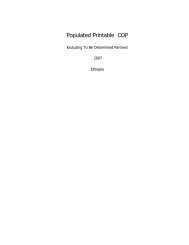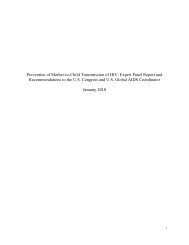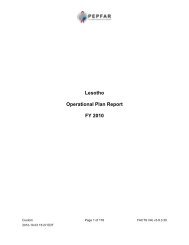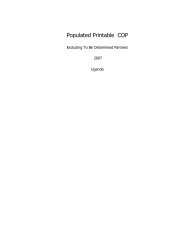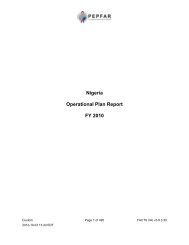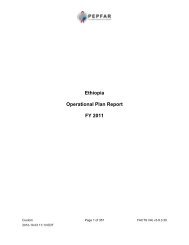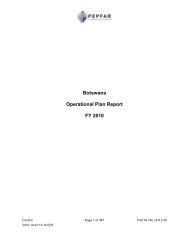Meaningful Involvement of People Living with HIV/AIDS - PEPFAR
Meaningful Involvement of People Living with HIV/AIDS - PEPFAR
Meaningful Involvement of People Living with HIV/AIDS - PEPFAR
You also want an ePaper? Increase the reach of your titles
YUMPU automatically turns print PDFs into web optimized ePapers that Google loves.
U . S . P r e s i d e n t ’ s E m e r g e n c y P l a n f o r A I D S R e l i e f<br />
President George W. Bush’s<br />
Emergency Plan for <strong>AIDS</strong><br />
Relief is the largest commitment<br />
ever by any nation for an<br />
international health<br />
initiative dedicated to<br />
a single disease -- a<br />
five-year, $15 billion,<br />
multifaceted approach to<br />
combating the disease<br />
around the world.<br />
U.S. Department <strong>of</strong> State<br />
U.S. Agency for<br />
International Development<br />
U.S. Department <strong>of</strong><br />
Defense<br />
U.S. Department <strong>of</strong><br />
Commerce<br />
U.S. Department <strong>of</strong> Labor<br />
U.S. Department <strong>of</strong> Health<br />
and Human Services<br />
Peace Corps<br />
Mailing address:<br />
SA-29, 2nd Floor<br />
2201 C Street, NW<br />
Washington, DC 20522-2920<br />
www.<strong>PEPFAR</strong>.gov<br />
<strong>Meaningful</strong> <strong>Involvement</strong> <strong>of</strong> <strong>People</strong> <strong>Living</strong> <strong>with</strong> <strong>HIV</strong>/<strong>AIDS</strong><br />
The United States is a signatory to the Paris Declaration <strong>of</strong> 1994, which outlines broad principles<br />
for the United Nations initiative on Greater <strong>Involvement</strong> <strong>of</strong> <strong>People</strong> <strong>Living</strong> <strong>with</strong> <strong>HIV</strong> and <strong>AIDS</strong><br />
in programs that affect their lives.<br />
In countries around the world, the U.S. President’s Emergency Plan for <strong>AIDS</strong> Relief (Emergency<br />
Plan /<strong>PEPFAR</strong>) is putting these principles into practice, by actively engaging people living <strong>with</strong><br />
<strong>HIV</strong> and <strong>AIDS</strong> (PLWHA) in planning for, delivering and monitoring the effectiveness <strong>of</strong> prevention,<br />
treatment and care services. Emergency Plan country teams consult <strong>with</strong> national networks<br />
<strong>of</strong> PLWHA to help determine priorities for annual operational plans, and to involve PLWHA in<br />
programming and efforts to assess program responsiveness.<br />
Programs supported by the Emergency Plan recognize PLWHA as:<br />
■<br />
■<br />
■<br />
■<br />
Vital contributors to the success <strong>of</strong> prevention efforts;<br />
Important partners in health care delivery;<br />
Sources <strong>of</strong> care and support for their communities; and<br />
Effective advocates who can help build in-country capacity, local ownership, and<br />
accountability to promote sustainable efforts.<br />
Prevention <strong>with</strong> Positives<br />
In many developing countries, those at highest risk for <strong>HIV</strong> infection are the uninfected sexual<br />
partners <strong>of</strong> people who are <strong>HIV</strong>-positive. Therefore, <strong>PEPFAR</strong> treatment and care programs are<br />
rapidly incorporating “Prevention <strong>with</strong> Positives” interventions that support PLWHA in reducing<br />
new <strong>HIV</strong> infections. Other prevention programs involve PLWHA in prevention programming as<br />
spokespeople to discuss the <strong>of</strong>ten difficult realities <strong>of</strong> living <strong>with</strong> <strong>HIV</strong>/<strong>AIDS</strong>.<br />
Most developing countries are years away from having enough trained health workers to meet all<br />
the needs <strong>of</strong> their nations’ health systems. <strong>PEPFAR</strong> programs are exploring novel approaches<br />
that draw on the contributions PLWHA can make in caring for themselves and members <strong>of</strong> their<br />
families and communities.<br />
Programs employ PLWHA to conduct home visits, monitor weight gain and other signs <strong>of</strong> improving<br />
health, look for emerging health problems, and deliver prescription refills to people on<br />
antiretroviral treatment. This approach not only provides meaningful paid work for PLWHA, but<br />
also helps decongest crowded health facilities, lower the number <strong>of</strong> facility-based health workers<br />
needed, and reduce travel burdens and associated costs for patients.<br />
Addressing Stigma and Discrimination<br />
On World <strong>AIDS</strong> Day 2006, President Bush directed the Secretary <strong>of</strong> State to request, and the<br />
Secretary <strong>of</strong> Homeland Security to initiate, a rulemaking process that would create a categorical<br />
waiver for PLWHA seeking to enter the United States on short-term visas. A 1993 law prohibits<br />
<strong>HIV</strong>-positive people from receiving visas to visit the U.S. <strong>with</strong>out a waiver, but a categorical<br />
waiver will enable PLWHA to enter the U.S. for short visits through a streamlined process.
U . S . P r e s i d e n t ’ s E m e r g e n c y P l a n f o r A I D S R e l i e f<br />
The Emergency Plan at Work<br />
The following examples are representative <strong>of</strong> the Emergency Plan’s efforts to support the active and meaningful involvement <strong>of</strong> PLWHA:<br />
■<br />
■<br />
■<br />
■<br />
■<br />
In South Africa, the Mothers to Mothers-to-Be program employs, trains and supports <strong>HIV</strong>-positive women who have received prevention<br />
<strong>of</strong> mother-to-child <strong>HIV</strong> transmission (PMTCT) interventions. These women educate pregnant, <strong>HIV</strong>-positive women about<br />
PMTCT. Through the program, women learn the importance <strong>of</strong> knowing their <strong>HIV</strong> status, how to access PMTCT programs, steps<br />
to prevent mother-to-child <strong>HIV</strong> transmission, and how they can benefit from the social support <strong>of</strong> other <strong>HIV</strong>-positive people.<br />
In Kenya, <strong>PEPFAR</strong> supports a number <strong>of</strong> efforts to link PLWHA who have similar interests. For example, in one network, <strong>HIV</strong>positive<br />
educators provide care for their network’s members and work to improve Kenya’s educational environment. In other<br />
networks, <strong>HIV</strong>-positive religious leaders, Muslim women and disabled people provide a similar supportive environment for their<br />
network’s members <strong>with</strong>in the community.<br />
In Mexico, a group <strong>of</strong> multinational corporations joined forces to launch a national business council in Mexico, called Consejo Nacional<br />
Empresarial Sobre SIDA (CONAES), on World <strong>AIDS</strong> Day 2004. The council was formed to identify the most difficult problem<br />
facing Mexico concerning <strong>HIV</strong>/<strong>AIDS</strong> – pervasive stigma and discrimination against PLWHA. In its first year, CONAES recruited<br />
more than 20 large, multinational companies to join the council, and also sponsored a conference on <strong>HIV</strong>/<strong>AIDS</strong> in the workplace. As<br />
members, companies commit human and financial resources to fighting discrimination against PLWHA in the workplace.<br />
In Nepal, a group <strong>of</strong> 15 Nepalese women founded Sneha Samaj, the first support group for women and children living <strong>with</strong> or affected<br />
by <strong>HIV</strong>/<strong>AIDS</strong>. Sneha Samaj means “community for love and affection.” The organization received start-up money to open a<br />
shop as an income-generating endeavor. With the funds, they purchased six sewing machines, sewing tables, racks, irons, scissors and<br />
lights, and employed seven women. Pr<strong>of</strong>its from the sale <strong>of</strong> products go toward Sneha Samaj’s treatment and care programs.<br />
In Côte d’Ivoire, RIP+ is an association <strong>of</strong> groups <strong>of</strong> PLWHA that employs integrated and comprehensive programming, building<br />
the capacity <strong>of</strong> local organizations to provide care and support to people living <strong>with</strong> <strong>HIV</strong>/<strong>AIDS</strong>. RIP+ received a <strong>PEPFAR</strong> New<br />
Partners Initiative grant on World <strong>AIDS</strong> Day 2006 to provide <strong>HIV</strong> counseling and testing, palliative care, and care for orphans and<br />
vulnerable children, as well as prevention programs using the ABC approach.<br />
Resources:<br />
The U.S. Government supports publication <strong>of</strong> regional and international directories <strong>of</strong> associations <strong>of</strong> people living <strong>with</strong> <strong>AIDS</strong>. Current directories are<br />
available at www.usaid.gov/our_work/global_health/aids/Publications/index.html. The U.S.-based National Association <strong>of</strong> <strong>People</strong> <strong>with</strong> <strong>HIV</strong>/<strong>AIDS</strong><br />
(NAPWA, www.napwa.org) and the Global Network <strong>of</strong> <strong>People</strong> <strong>Living</strong> <strong>with</strong> <strong>HIV</strong>/<strong>AIDS</strong> (GNP+, www.gnpplus.net) are frequently involved in program planning,<br />
implementation and assessment.<br />
w w w . P E P F A R . g o v


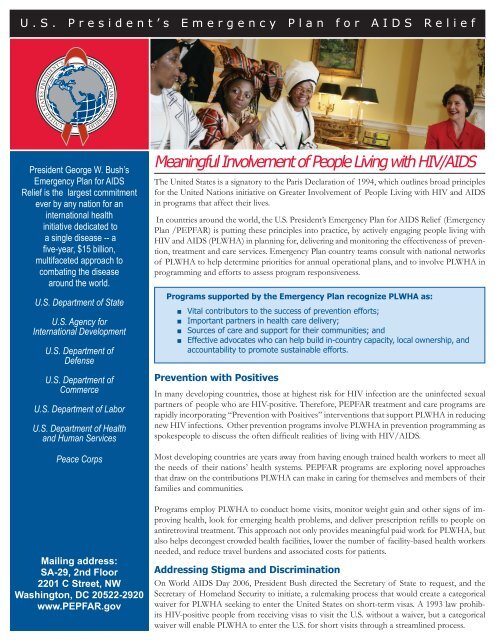

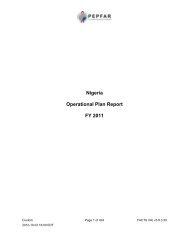
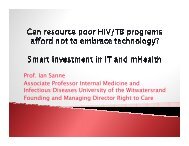

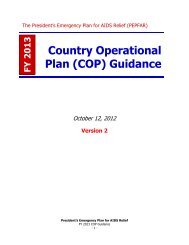
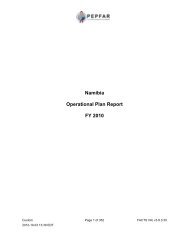
![PEPFAR Fiscal Year 2005 Operational Plan [pdf]](https://img.yumpu.com/25232699/1/190x245/pepfar-fiscal-year-2005-operational-plan-pdf.jpg?quality=85)
